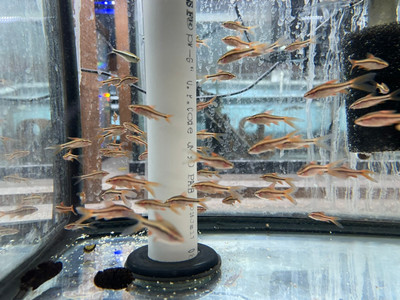Longfin Cherry Barb: A Striking Addition to Your Aquatic World
Posted by Max Gandara on on 13th Jun 2023
Longfin Cherry Barb: A Striking Addition to Your Aquatic World
The Longfin Cherry Barb, scientifically known as Puntius titteya, is a
captivating freshwater fish that has gained popularity among aquarists
due to its vibrant colors and graceful fins. This small, peaceful
species originates from Sri Lanka and belongs to the family Cyprinidae.
With its lively behavior and eye-catching appearance, the Longfin Cherry
Barb makes for an excellent addition to community aquariums.
Appearance and Coloration:
The most notable feature of the Longfin Cherry Barb is its elongated,
flowing fins, which give it a distinct and graceful appearance. The
dorsal, anal, and pelvic fins are considerably longer in comparison to
other Barb species. The body shape is slender and streamlined, creating
an elegant silhouette.
The coloration of the Longfin Cherry Barb is truly stunning. The body is
predominantly silver, adorned with horizontal black stripes that
stretch from the gills to the caudal fin. The males exhibit intense red
coloration on the upper half of their body, which intensifies during
breeding periods. Females, on the other hand, showcase a subtler red
hue. The combination of silver and red creates a striking contrast,
making the Longfin Cherry Barb a true gem in any aquarium.
Behavior and Compatibility:
Longfin Cherry Barbs are known for their peaceful nature, making them
ideal for community aquariums. They are active swimmers and prefer to
reside in schools, so it's recommended to keep them in groups of at
least six individuals. The presence of other peaceful fish species such
as tetras, rasboras, and dwarf gouramis can enhance their social
behavior and create a harmonious aquatic environment.
While they are generally peaceful, it's important to note that male
Longfin Cherry Barbs can display aggression towards each other,
especially during breeding. Providing ample hiding spots with live
plants, rocks, or driftwood helps create territorial boundaries and
reduces aggression. Overall, maintaining a well-balanced community tank
with compatible tankmates ensures a stress-free environment for the
Longfin Cherry Barb.
Aquarium Requirements:
To provide a comfortable habitat for the Longfin Cherry Barb, it's
crucial to set up an aquarium that meets their specific needs. A minimum
tank size of 20 gallons (75 liters) is recommended to accommodate a
school of these fish. The tank should be densely planted with a variety
of plants, including floating ones to simulate their natural habitat.
Maintaining stable water parameters is vital for the well-being of these
fish. The ideal temperature range is between 72°F and 79°F (22°C -
26°C), with a pH level of 6.0 to 7.5 and a water hardness of 5 to 12
dKH. Regular water changes and the use of a reliable filtration system
are essential to ensure clean and healthy water conditions.
Feeding:
Longfin Cherry Barbs are omnivorous and will readily accept a wide range
of foods. In their natural habitat, they primarily feed on small
insects, larvae, and plant matter. In captivity, they can be fed a
varied diet consisting of high-quality flakes, pellets, freeze-dried or
frozen foods such as bloodworms, brine shrimp, and daphnia.
Supplementing their diet with vegetable matter like blanched spinach or
lettuce is beneficial for their overall health.
Breeding:
Breeding Longfin Cherry Barbs can be a rewarding experience. To
encourage spawning, a separate breeding tank with softer, slightly
acidic water conditions is recommended. The addition of fine-leaved
plants or a spawning mop provides a suitable substrate for the female to
lay her eggs.

